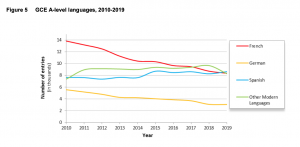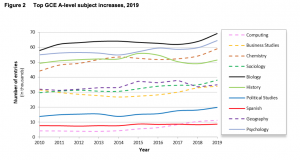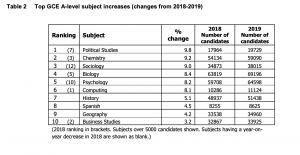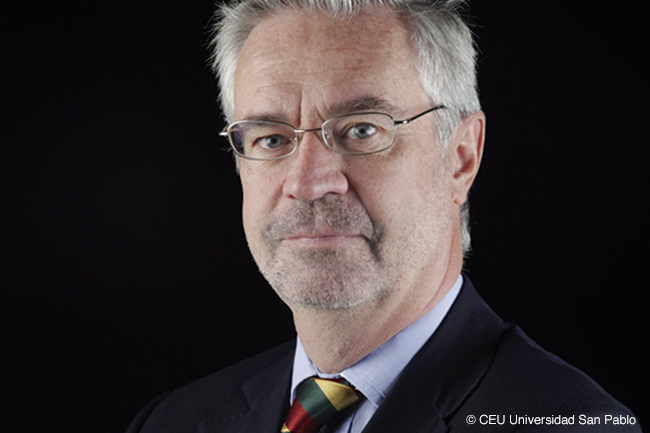Instituto Cervantes Secretary General signs an agreement with the Chamber of Commerce to promote Spanish in the United Kingdom
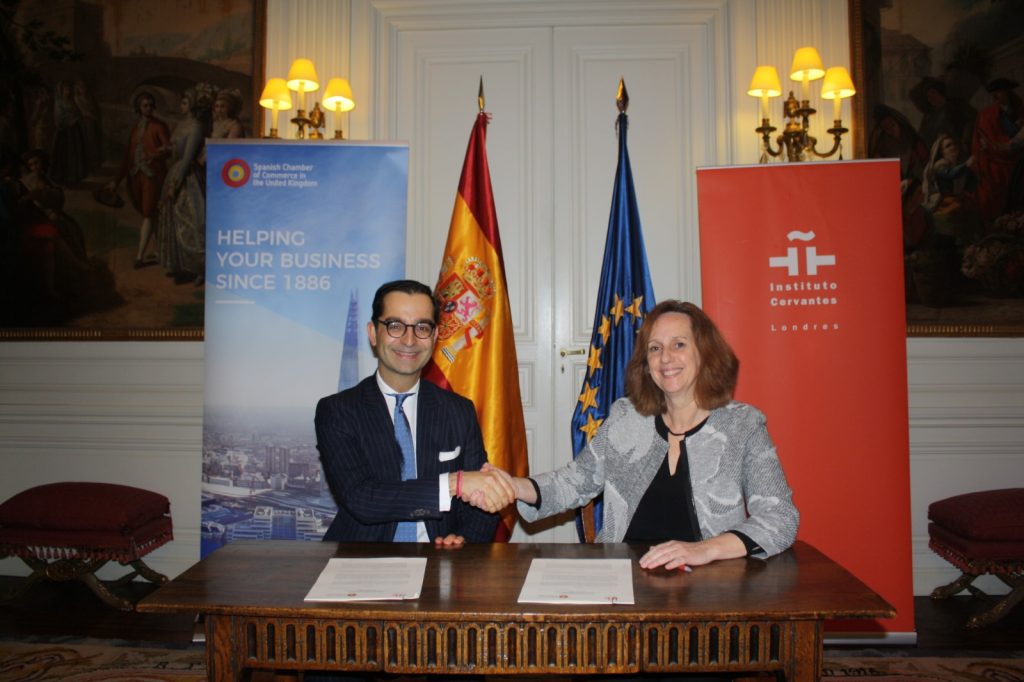
This morning, Carmen Noguero, Secretary General of the Spanish cultural institution, signed two documents: the first cooperation protocol between Instituto Cervantes and the British Council and also an agreement with the Spanish Chamber of Commerce in the United Kingdom for the promotion of Spanish language and culture. Likewise, Noguero has presented the Spanish in the World 2019 Yearbook to Spanish-American ambassadors, diplomats and academics, at one event, and to Spanish teachers, Hispanic and cultural managers at another event.
Tomorrow, Noguero will head to Oxford University where she will conclude her trip accompanied by the director of International Relations at Instituto Cervantes, Rafael Soriano; the director of Institute Cervantes in London, Ignacio Peyró; and the director for Manchester and Leeds, Francisco Oda.
Yearbook presentations to diplomats and Hispanists
Noguero visited Instituto Cervantes in London, where she held a meeting with the staff of the three Cervantes institutions in the United Kingdom: London, Manchester and Leeds. She was shown the library and the centre’s historical archive, which are well-known for their collection of travel books in Spain and documentation of the Civil War.
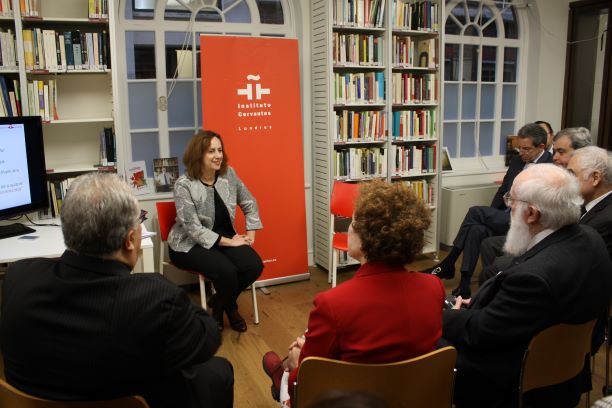
Her first public event was the presentation of the largest academic publication by Instituto Cervantes, the 2019 edition of The Spanish in the world yearbook. Previously, a large delegation of Latin American diplomats and academics.
The ambassadors of Honduras, Guatemala, Nicaragua, Paraguay, Ecuador, Panama, Peru and El Salvador were at the event, in addition to Cristina Cortés, director of Canning House, the prestigious think tank on Latin American affairs; and the director of the office of the Universidad Autónoma de México in London, Ana Elena González, among others. The different offices of Instituto Cervantes cooperate in cultural matters continuously with the Embassies and cultural councils of the Latin American countries.
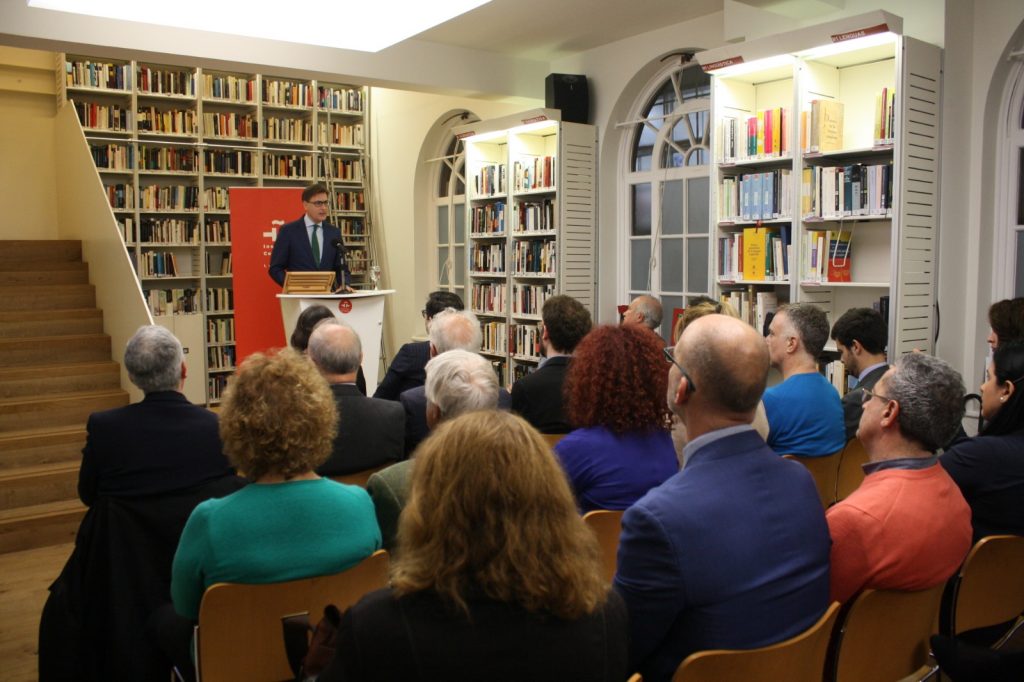
The Secretary General also presented the yearbook at another event for Spanish teachers in the United Kingdom, Hispanists and cultural managers. Among the attendees were guests and professors such as Sir Barry Ife, Trevor Dadson, Catherine Davies or Sebastian Balfour, and the president of the association of Spanish teachers in the United Kingdom (ELE-UK), Vicens Colomer.
Spanish in the world 2019 gathers current data and in-depth analysis on the presence and importance of the Spanish language globally. In this edition, the volume highlights significant figures such as the 580 million people who speak Spanish in the world (7.6% of the world’s population). Of these, 483 million are native speakers which makes Spanish the second mother tongue in the world by number of speakers. In addition, about 22 million people in 110 countries study it as a foreign language. Spanish is also the third most used language on the internet, and the report corresponding to 2019 reflects, as a novel fact, its growth in Linkedin.
Agreement signature with the Spanish Chamber of Commerce
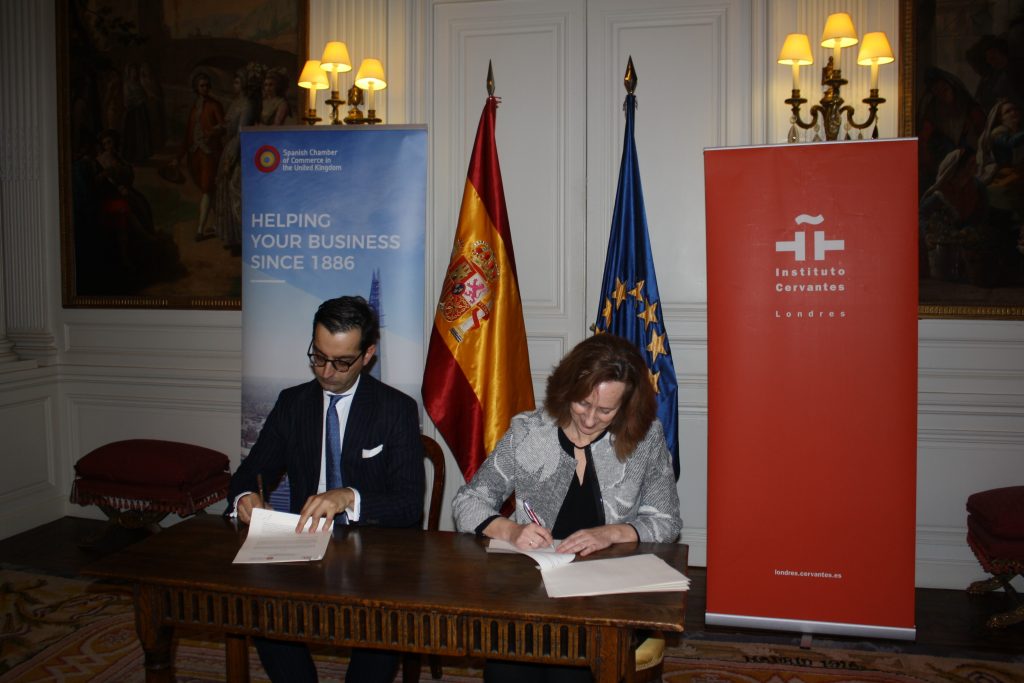
Together with the protocol signed with the British Council, the agreement signed with the Spanish Chamber of Commerce in the United Kingdom is one of the strengths of the trip. The event took place at the residence of the ambassador of Spain in London, Carlos Bastarreche, and was signed by the Chamber’s president, lawyer and solicitor Eduardo Barrachina. Barrachina stressed the importance of the agreement as a “model of public collaboration- private service to the projection of Spanish culture”.
“The Chamber and its companies understand very well that Spanish and Spanish culture are a source of wealth. This framework of collaboration guarantees that the Spanish culture has greater projection in the United Kingdom, and with this signature, the Chamber and its companies recognize the economic value of the Spanish culture,” said Barrachina.
In the agreement, the first signed by both institutions, various actions to promote the Spanish language and culture are contemplated, especially in the field of Spanish for business. The Chamber brings together more than three hundred Spanish companies operating in the United Kingdom.
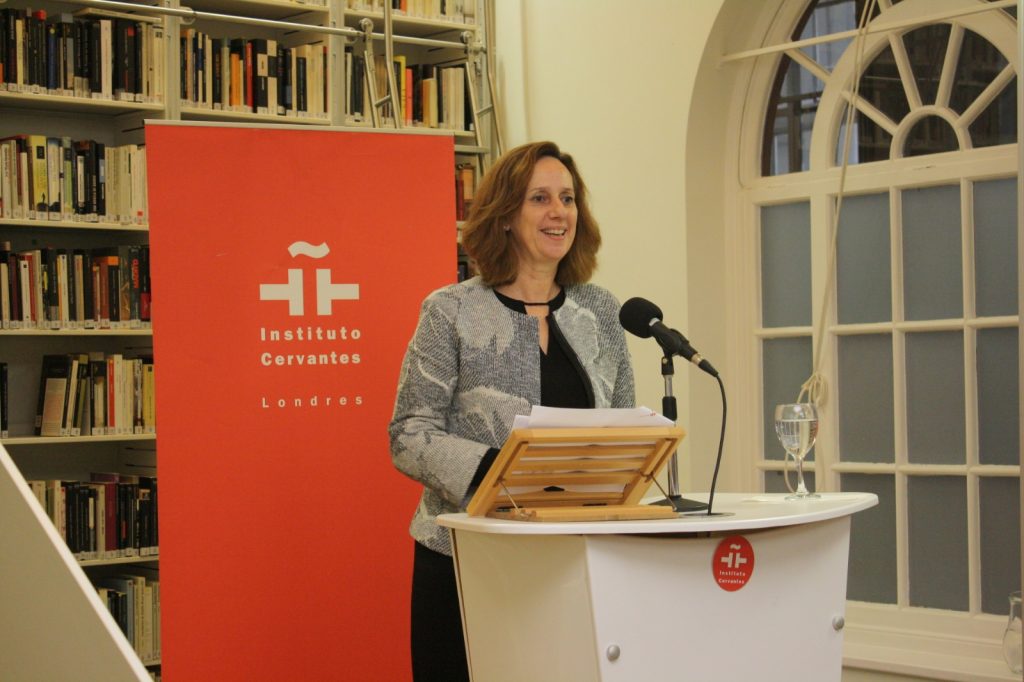
Meeting with Spanish executives of the City
At the end of the afternoon, Noguero attended the Christmas reception of the British Spanish Society, a charity founded in 1916 that promotes friendship and understanding between British and Spanish people. Noguero’s journey culminated with a dinner, offered by Hispania restaurant, with representatives of the Chamber of Commerce and the Spanish business and financial world in the City of London.
Visit to Sir John Elliott and hispanism authorities in Oxford
Tomorrow, Noguero, at the culmination of her trip, will meet with the great Hispanic and Prince of Asturias Award for Social Sciences Sir John Elliott in the city of Oxford. Likewise, she will hold meetings at Exeter College with the greatest academic authorities in Hispanicism and teaching of the language of the famous university, specifically, professor “Alfonso XIII” of Spanish Studies, Jonathan Thacker, and professor and coordinator of Spanish in the Faculty of Medieval and Modern Languages, Javier Muñoz-Basols. Finally, the General Secretary will attend a lunch at Magdalen College, offered in her honor by professor of Spanish literature Juan Carlos Conde, promoter of the Madariaga Cycle of conferences on Spanish issues, with which the Instituto Cervantes collaborates.
La Secretaria General del Cervantes firma un acuerdo con la Cámara de Comercio para impulsar el español en Reino Unido

Tras la firma esta mañana del primer protocolo de cooperación entre el Instituto Cervantes y el British Council, la Secretaria General de la institución cultural española, Carmen Noguero, suscribió un acuerdo con la Cámara de Comercio de España en Reino Unido para el fomento de la lengua y cultura españolas. Asimismo, la ‘número dos’ del Cervantes presentó el anuario El español en el mundo 2019 ante embajadores, diplomáticos y académicos hispanoamericanos, por una parte, y ante profesores de español, hispanistas y gestores culturales, por otra.
La Secretaria General del Instituto Cervantes se trasladará mañana a la Universidad de Oxford, donde pondrá punto final a un viaje en el que le acompañan el director de Relaciones Internacionales del Instituto Cervantes, Rafael Soriano; el director del centro de Londres, Ignacio Peyró; y el director de los centros de Mánchester y Leeds, Francisco Oda.
Presentaciones del Anuario ante diplomáticos e hispanistas

Noguero visitó el Instituto Cervantes en Londres, donde mantuvo una reunión con el personal de los centros de la institución en Reino Unido (Londres, Mánchester y Leeds), y conoció de primera mano la biblioteca y el archivo históricos del centro, notables, respectivamente, por su colección de libros de viajes por España y su documentación de la Guerra Civil.
Su primer acto público fue la presentación de la mayor publicación académica del Instituto Cervantes, el anuario El español en el mundo, en su edición de 2019, ante una nutrida delegación de diplomáticos y académicos hispanoamericanos. En el público estuvieron presentes los embajador de Honduras, Guatemala, Nicaragua, Paraguay, Ecuador, Panamá, Perú y El Salvador, además de Cristina Cortés, directora del think-tank de referencia en asuntos iberoamericanos, Canning House; y la directora de la oficina de la Universidad Autónoma de México en Londres, Ana Elena González, entre otras personalidades. Las distintas sedes del Instituto Cervantes cooperan en materia cultural de modo continuado con las Embajadas y consejerías culturales de los países hispanoamericanos.

La Secretaria General también presentó su anuario en otro acto destinado a profesores de español en Reino Unido, hispanistas y gestores culturales. Entre los asistentes se pueden mencionar a profesores como Sir Barry Ife, Trevor Dadson, Catherine Davies o Sebastian Balfour, o el presidente de la asociación de docentes de español en Reino Unido (ELE-UK), Vicens Colomer.
El español en el mundo 2019 reúne datos actualizados y análisis en profundidad sobre la presencia e importancia de la lengua española a nivel global. En esta edición, el volumen destaca cifras significativas como los 580 millones de personas que hablan español en el mundo (el 7,6% de la población mundial). De ellas, 483 millones son hablantes nativos, lo que convierte al español en la segunda lengua materna del mundo por número de hablantes. Además, cerca de 22 millones de personas en 110 países lo estudian como lengua extranjera. El español es asimismo la tercera lengua más utilizada en internet, y el informe correspondiente a 2019 refleja, como dato novedoso, su crecimiento en Linkedin.
Firma de un acuerdo con la Cámara de Comercio española

Junto al protocolo firmado con el British Council, el acuerdo suscrito con la Cámara Oficial de Comercio de España en el Reino Unido es uno de los puntos fuertes del viaje. El acto tuvo lugar en la residencia del embajador de España en Londres, Carlos Bastarreche, y contó como signatario por parte de la Cámara con su presidente, el abogado y solicitor Eduardo Barrachina, quien subrayó la importancia del acuerdo como “modelo de colaboración público-privada al servicio de la proyección de la cultura española”.
“La Cámara y sus empresas entienden muy bien que el español y la cultura española son fuente de riqueza. Este marco de colaboración garantiza que la cultura española tenga mayor proyección en el Reino Unido, y con esta firma, la Cámara y sus empresas reconocen el valor económico de la cultura española”, afirmó Barrachina.
En el acuerdo, el primero que firman ambas instituciones, se contemplan diversas acciones de promoción de la lengua y cultura españolas, en especial en el ámbito del español para los negocios. La Cámara aglutina a más de trescientas empresas españolas que operan en Reino Unido.

Encuentro con ejecutivos españoles de la City
Al terminar la tarde, Carmen Noguero asistió a la recepción de Navidad de la British Spanish Society, una organización benéfica fundada en 1916 y que promueve la amistad y el entendimiento entre británicos y españoles. Su día culminó con una cena, ofrecida por el restaurante Hispania, con representantes de la Cámara de Comercio y del mundo empresarial y financiero español en la City de Londres.
Visita a Sir John Elliott y a autoridades del hispanismo en Oxford
Mañana, la Secretaria General del Cervantes, como culminación de su viaje, se entrevistará con el gran hispanista y premio Príncipe de Asturias de Ciencias Sociales Sir John Elliott, en la ciudad de Oxford. Asimismo, mantendrá reuniones en Exeter College con las mayores autoridades académicas en hispanismo y docencia de la lengua de la célebre universidad, en concreto, el catedrático “Alfonso XIII” de Estudios Españoles, Jonathan Thacker, y el profesor titular y coordinador de español en la Facultad de Lenguas Medievales y Modernas, Javier Muñoz-Basols. Por último, Carmen Noguero asistirá en Magdalen College a un almuerzo ofrecido en su honor por el catedrático de literatura española Juan Carlos Conde, impulsor del Ciclo Madariaga de conferencias sobre temas españoles, con el que colabora el Instituto Cervantes.
For the first time, Instituto Cervantes and the British Council sign an agreement to promote «joint work» in London
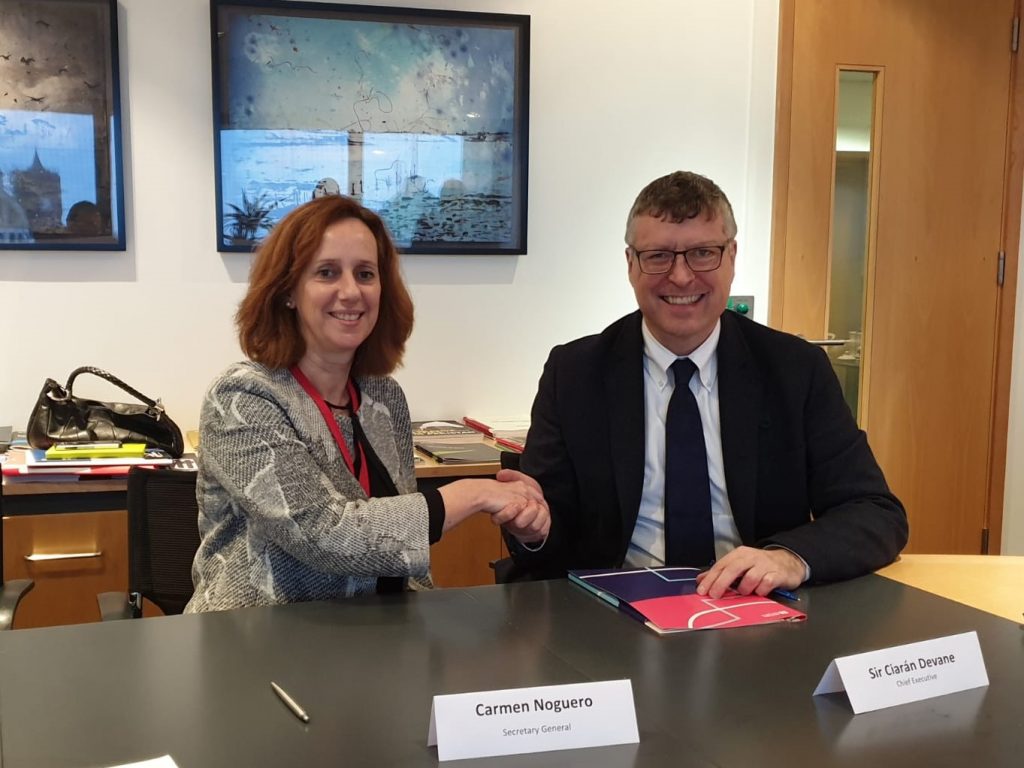
The secretary general of Instituto Cervantes, Carmen Noguero, and the executive director of the British Council, Sir Ciarán Devane, signed a collaboration agreement in London today – the first one signed by both parties- with the aim of strengthening the bilateral dialogue and promoting «the joint work »so that each institution can« achieve its strategic results more effectively».
The agreement includes the future participation of Instituto Cervantes and the British Council in joint projects and exchange programs, as well as a possible coordination of their respective strategic plans.
In this first official meeting, held at the headquarters of the British organisation in London, Noguero was accompanied by the director of International Relations at Instituto Cervantes, Rafael Soriano, and the directors of Instituto Cervantes in London, Ignacio Peyró, and of Manchester and Leeds, Francisco Oda.
Sir Ciarán Devane also attended on behalf of the British Council, as well as Siobhan Foster-Perkins who is the regional director for the European Union, the rest of Europe and the Americas; the regional director for the European Union, Andy Mackay, and the director of Spain, Mark Howard.

Strengthening European cooperation
The signing of this unprecedented memorandum of understanding between both institutions aims to give continuity and reinforce the fruitful dialogue between Spain and the United Kingdom. It will build on the conversations held over the last year in the field of cultural diplomacy, and the joint exploration of new approaches to work on the agendas.
At the meeting held in London today, each party gave a presentation of its organisation and external network, as well as an introduction to its strategic plan. Afterwards, they analysed the current status of foreign languages and their learning in both Spain and the United Kingdom.
In this regard, both delegations underlined the characteristics of both Spanish and English languages as constantly growing international communication languages, «complementary and not competing with each other.» They also agreed to claim the teaching and learning of languages as part of the response to the challenges of globalisation.
At the end of the meeting and the signing of the agreement, Carmen Noguero expressed her satisfaction for “sharing agendas in areas of joint interest and sharing resources and experiences”. For his part, Sir Ciarán Devane said that the collaboration between both parties «will contribute to improving links between our organisations and creating new cultural and educational connections between people around the world.»
El Instituto Cervantes y el British Council firman por primera vez en Londres un acuerdo para impulsar «el trabajo conjunto»
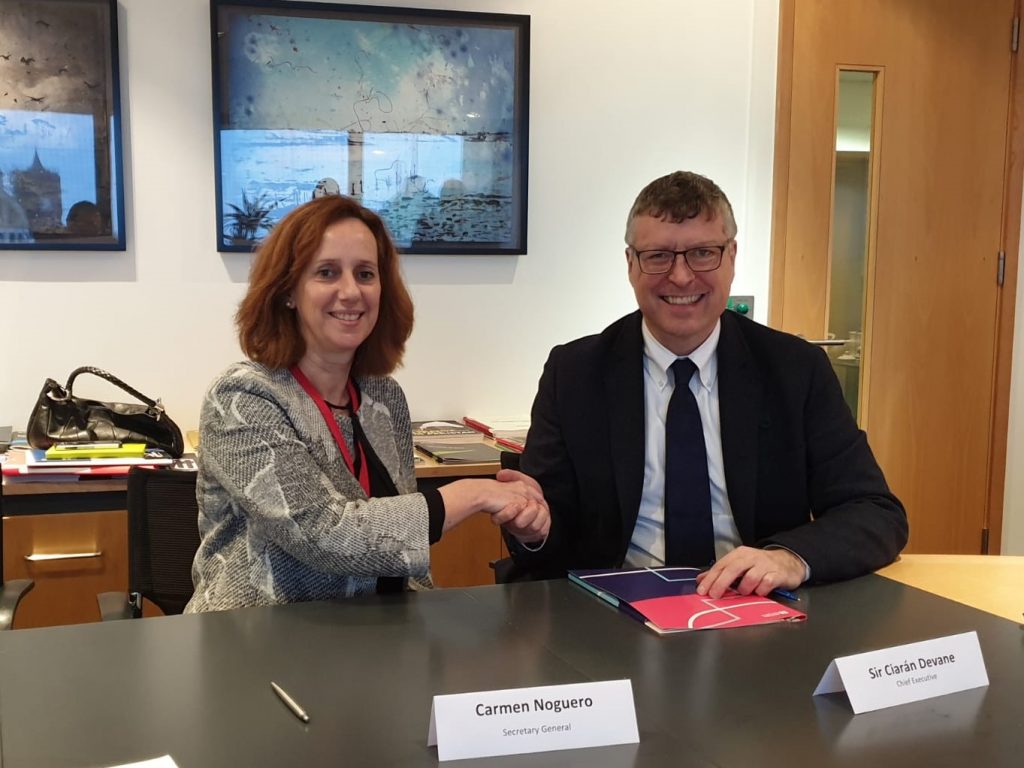
La secretaria general del Instituto Cervantes, Carmen Noguero, y el director ejecutivo del British Council, Sir Ciarán Devane, firmaron hoy en Londres un acuerdo de colaboración –el primero que suscriben ambas entidades– con el objetivo de reforzar el diálogo bilateral e impulsar «el trabajo conjunto» para que cada institución pueda «lograr sus resultados estratégicos de manera más efectiva».
El acuerdo incluye la eventual participación del Instituto Cervantes y del British Council en proyectos conjuntos o en programas de intercambios, así como una posible coordinación de los planes estratégicos respectivos.
En esta primera reunión oficial, celebrada en la sede del organismo británico, acompañaron a Carmen Noguero, por parte del Instituto Cervantes, el director de Relaciones Internacionales, Rafael Soriano, y los directores de los centros de Londres, Ignacio Peyró, y de Mánchester-Leeds, Francisco Oda.
Por parte del British Council asistieron, además de Sir Ciarán Devane, la directora regional para Unión Europea, resto de Europa y las Américas, Siobhan Foster-Perkins; el director regional para la Unión Europea, Andy Mackay, y el director de España, Mark Howard.

Reforzando la cooperación europea
La firma de este primer memorándum de entendimiento tiene como objeto dar continuidad y reforzar la fructífera interlocución que España y el Reino Unido han mantenido en el último año en el ámbito de la diplomacia cultural, y la exploración conjunta de nuevos enfoques para trabajar en las agendas europeas.
En la reunión mantenida hoy en Londres, cada una de las partes hizo una presentación de su organización y red exterior, así como una introducción a su plan estratégico. A continuación, analizaron la situación de las lenguas extranjeras y su aprendizaje tanto en España como en Reino Unido.
A este respecto, ambas delegaciones subrayaron el carácter del español y el inglés como lenguas de comunicación internacional en constante crecimiento, «complementarias y no competidoras entre sí». Coincidieron además en reivindicar la enseñanza y el aprendizaje de idiomas como parte de la respuesta a los desafíos de la globalización.
Al término de la reunión y la firma del acuerdo, Carmen Noguero manifestó su satisfacción por «compartir agendas en áreas de interés conjunto y poner en común recursos y experiencias». Por su parte, Sir Ciarán Devane declaró que la colaboración entre ambas partes «contribuirá a mejorar los vínculos entre nuestras organizaciones y a crear nuevas conexiones culturales y educativas entre personas de todo el mundo».
London celebrates the new translation of Rubén Darío’s poetry by Hispanic Feinstein
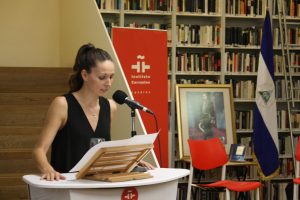
The bilingual poetry recital, organized by Instituto Cervantes in London, was supported by the Embassy of Nicaragua and the presence of Spanish-American ambassadors
Instituto Cervantes in London organised a poetry reading of the work of Nicaraguan poet Rubén Darío by the renowned hispanist Adam Feinstein, in an event that was also the pre-launch for his new book, “Found in Translation: New Versions of Rubén Darío”. The event was supported by the Embassy of Nicaragua.
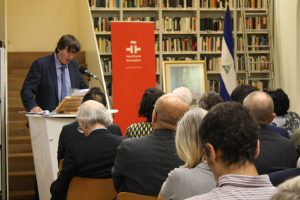
The conference was attended by the Ambassador of Nicaragua in the United Kingdom, Guisell Morales Echaverry; the director of Instituto Cervantes in London, Ignacio Peyró; actress María Estévez-Serrano, who recited Darío’s verses in Spanish; as well as the ambassador of Cuba in the United Kingdom, Teresita de Jesus Vicente Sotolongo; and the Guatemalan ambassador to the United Kingdom, Acisclo Valladares Molina.
Morales Echaverry thanked Feinstein’s work and effort to bring Darío’s work into the language of Shakespeare. Furthermore, the director of Instituto Cervantes in London highlighted Darío as one of the most important poets of Spanish language. He also celebrated Feinstein’s “great” work in “translating his [Dario’s] unique rhythm and language.»
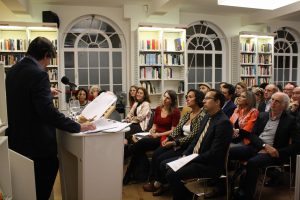
Along the same lines, Feinstein highlighted the importance of the Nicaraguan poet and read a selection of his poems’ translations into English. His new work will be a bilingual edition of different works of poetry from all stages of Darío’s life, which will be published in Nicaragua and the United Kingdom in early 2020. “I was lucky to be in Nicaragua in February this year, and the influence of Rubén Darío is lived in all parts of the country, as well as throughout the Spanish-speaking world,” said Feinstein.
Feinstein, born in Cambridge, published the acclaimed biography, “Pablo Neruda: A passion for life,” that was published by Bloomsbury in 2004. He also wrote the introduction to the English edition of Jorge Luis Borges’ Labyrinths ( The Folio Society, 2007).
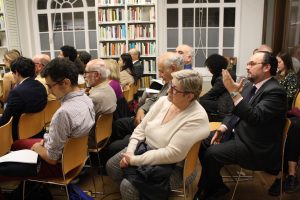
El español ya es la lengua extranjera más solicitada en los exámenes preuniversitarios británicos
El número de alumnos que se examinó de lengua española en las pruebas preuniversitarias del Reino Unido superó este año por primera vez a los de francés, según datos divulgados este jueves por Consejo Único de Calificaciones británico (JCQ, en inglés).
En total, 8.625 alumnos se matricularon de español en los exámenes conocidos como A-Levels, un 4,3 % más que el año pasado, mientras que los de francés descendieron un 3,8 %, hasta 8.355, y los de alemán cayeron también, un 0,7 %, hasta 3.033 alumnos.
Desde 2011, los test preuniversitarios de español en el Reino Unido han aumentado un 15 %, mientras que los de francés se han desplomado un 36 %.
El director del Instituto Cervantes de Londres, Ignacio Peyró, explicó que en los últimos años ha habido preocupación por los estudiantes que toman idiomas extranjeros en GCSE y A-level.
«Para nosotros, por supuesto, es muy positivo que el español esté creciendo y creo que en un país global como el Reino Unido, hay una percepción creciente de que el mundo de habla hispana se está volviendo más importante en términos de demografía, economía, comercio, cultura, etc», señaló Peyró.
«¿Quién hubiera pensado que hace 20 ó 30 años que esto iba a suceder?», añadió Peyró, señalando como en aquel momento, otros idiomas como el francés se enseñaban con más frecuencia.
«El español estaba en un lugar muy diferente en ese momento», recalcó Peyro, quien añadió que era «bueno estudiar cualquier idioma extranjero, mejor que ninguno».
«Espero que todos los idiomas extranjeros pronto vuelvan a aumentar en Reino Unido», agregó.
Más información: nota de prensa de JCQ ,Diario ABC, La Vanguardia
Ciclo Grandes hispanistas británicos #4 | Great British Hispanists Series #4: Charles Powell
Charles Powell en conversación con Dr. Julio Crespo Mac Lennan
MARTES 7, 6:30pm
En español con traducción simultánea a inglés
Auditorio del Instituto Cervantes de Londres
Director del Real Instituto Elcano desde el 2012. Nacido en 1960 de padre inglés y madre española, doctor en Historia por la Universidad de Oxford donde fue profesor de Historia en Corpus Christi College, J. A. Pye Fellow en University College, y Research Fellow en St. Antony’s College, institución a la que sigue vinculado como miembro del Senior Common Room.
Entre 1997 y 2000 fue director adjunto del programa de Estudios Europeos del Instituto Universitario Ortega y Gasset, siendo posteriormente Subdirector del Centro Español de Relaciones Internacionales (CERI) de la Fundación José Ortega y Gasset. En 2001 se incorporó al Real Instituto Elcano como investigador principal para la Unión Europea. Desde 2002 es profesor de Historia Contemporánea de la Universidad CEU San Pablo. Entre sus numerosas publicaciones destacan: El amigo americano. España y EEUU de la dictadura a la democracia (Galaxia Gutenberg, 2011); “España en Europa, Europa en España”, y Las democracias occidentales frente al terrorismo global, coeditado con Fernando Reinares (Editorial Ariel, 2008). Desde 2011 es miembro del Consejo del European Council on Foreign Relations (ECFR).
Entrada libre Reserva obligatoria: reservas.londres@cervantes.es | 0207 201 0752
Charles Powell in conversation with Dr. Julio Crespo Mac Lennan
TUESDAY 7, 6:30pm
In Spanish with simultaneous translation into English
Auditorium Instituto Cervantes London
Charles Powell read History and Modern Languages at Oxford University, where he later wrote a D. Phil. thesis on Spain’s transition to democracy. He was subsequently a Lecturer in History at Corpus Christi College, Oxford, the J. A. Pye Research Fellow at University College, Oxford, and a Junior Research Fellow at St. Antony’s College, Oxford, where he is currently a Member of the Senior Common Room.
From 1997 to 2000 he was deputy director of the European Studies programme of the Ortega y Gasset University Institute, and was later appointed deputy director of the Ortega y Gasset Foundation’s Spanish Centre for International Relations (CERI). In 2001 he joined the Elcano Royal Institute as Senior Analyst for Europe, and in 2004 he was appointed Deputy Director for Research and Analysis. Since 2001, he is also a Professor in Contemporary History at the CEU San Pablo University (Madrid). Since 2011, he is a member of the council of the European Council on Foreign Relations (ECFR).
Selected publications: His recent published work on international affairs includes El amigo americano. España y EEUU de la dictadura a la democracia (Galaxia Gutenberg, 2011), ‘España en Europa, Europa en España’ (en Emilio Lamo de Espinosa (coord.), Europa después de Europa, Academia Europea de Ciencias y Artes, 2010) and Las democracias occidentales frente al terrorismo global (coeditado con Fernando Reinares, Editorial Ariel, 2008).
Admission free booking essential: reservas.londres@cervantes.es | 0207 201 0752
Sursum Linguae 2014: European Cultural Walking Tour
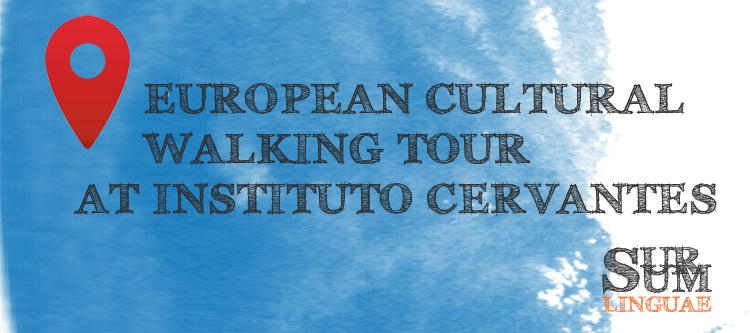
17 September 2014
Balassi Institute Hungarian Cultural Centre
Camões Institute
Instituto Cervantes London
Goethe-Institut
Italian Cultural Institute
This is EUNIC
EUNIC is the network of the international cultural institutes from the member states of the European Union. It was formed in 2006 and has 29 members from 24 countries. Around the world, member institutes come together in “clusters” to develop local activities, and there are over 80 clusters at present. They have an international reputation as Europe’s leading cultural relations practitioners. Their projects focus on arts, languages, youth, and education, science, intercultural dialogue, and devel- opment sectors.
EUNIC London is the network of the cultural institutes from the member states of the European Union in London. Established in September 2007 the network has at present 31 members who share knowledge and resources on common projects, with the aim of developing European cultural diversity and creativity in the UK.
Why a European Cultural Centres walking tour?
The Sursum Linguae project involves several communication and debate projects to be held in London throughout the year. One part of this project is this guided tour of some of the most representative European cultural institutes in London. Thanks to Sursum Linguae, EUNIC aims to raise awareness and bring to London’s audience the multilingual diversity represented by the European cultural institutes. The diversity within the walls and the cultural richness from its rooms have prompted us to organise this tour, which aims to “stage” in one afternoon the union within diversity in the field of EUNIC, for those who want to enrol therefore in a “glocal” concept of cultural and linguistic experience. The thrill of the living experience cannot be replaced: nothing compares to the actual touch of books and accents, to walk through the rooms filled with echoes, the smell of history of the buildings, and the dynamism which brings the direct contemplation of the various proposals we support.
Walking Tour events at the Instituto Cervantes London
The Instituto Cervantes London will offer a range of activities and discounts for all new students. Level tests between 5pm and 8pm. Enrolment will be open, exceptionally, until 8pm! Plus there will be a 10 % discount for all new students who enrol in person on that day. 20 minutes taster lessons for absolute beginners, at 5 and 6pm.
Guided tours for the exhibitions “Out of the Cage” at 6:30pm and “Cornwall & Hidalgo and enduring connection” at 7pm.
Guided tours to Reina Sofia Library and 10% discount for all new members who joining the library on the day.
Escritores españoles y latinoamericanos galardonados con el Premio Nobel de Literatura | Spanish and Latin American Literature Nobel Prize Winners
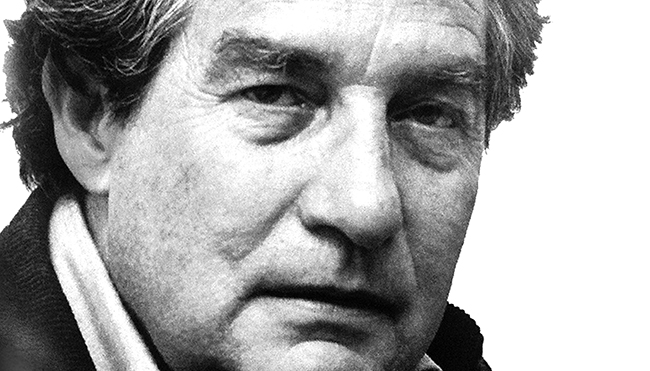
Octavio Paz y la poesía internacional
A cargo del Dr. Tom Boll, King’s College
Coordinado por la Dra. Maria José Blanco, King’s College
MAR 10 JUNIO, 6:30pm
Auditorio del Instituto Cervantes de Londres
Octavio Paz nació en México en 1914. Estudió Derecho y Literatura en la Universidad Nacional de México. Comenzó a publicar poesía durante su adolescencia, animado por Pablo Neruda. Fundó la revista de literatura Barandal y publicó su primer libro de poemas, Luna silvestre en 1933. Paz vivió en Estados Unidos y Europa recibiendo la influencia del movimiento surrealista. El laberinto de la soledad publicado en 1950 le posicionó como una figura literaria de primera nivel. En 1962, fue designado Embajador de México en India, dimitiendo de su cargo seis años después como protesta a la masacre de Tlatelolco en México D.F. durante 1968. Junto a su labor como poeta, Paz ha publicado ensayos en los que conecta la Cultura, Lingüística, Teoría de la Literatura, Historia y Política. Paz recibió el Premio Cervantes en 1981, el Premio Neustandt en 1982 y el Nobel de Literatura en 1990. Paz falleció en 1998.
Tom Boll es autor de Octavio Paz and T. S. Eliot: Modern Poetry and the Translation of Influence (Legenda, 2012). Ha publicado sobre literatura Latinoamericana y traducción, produciendo ediciones bilingües de los poetas Coral Bracho y David Huerta. Es profesor en el Departamento de Español, Portugués y Estudios Latinoamericanos en King’s College London.
En inglés
Coorganizado por la Oficina para Asuntos Culturales y Científicos de la Embajada de España en el Reino Unido y el Instituto Cervantes de Londres
Con la colaboración de King’s College London
Entrada libre reserva obligatoria reservas.londres@cervantes.es | 0207 201 0752
Octavio Paz and International Poetry
By Dr. Tom Boll, King’s College
Coordinated by Dr Maria José Blanco, King’s College
TUE 10 JUNE, 6:30pm
Auditorium del Instituto Cervantes de Londres
Octavio Paz (1914-1998) He studied Law and Literature at the National University of Mexico. Paz started publishing poems in his teens encouraged by Pablo Neruda. He founded and avant-garde literary magazine, Barandal and published his first book of poems, Luna silvestre in 1933. Paz lived in the United States and Europe and was influenced by Modernist and Surrealist movements. El laberinto de la soledad published in 1950 established him as a major literary figure. In 1962, he became Mexico’s ambassador to India and resigned six years later in protest of the Tlatelolco massacre in Mexico City in 1968. Apart form his work as a poet, Paz published essays which engage culture, linguistics, literary theory, history and politics. Paz was awarded the Cervantes Prize in 1981, the Neustandt Prize in 1982 and the Nobel Prize in literature in1990.
Tom Boll is the author of Octavio Paz and T. S. Eliot: Modern Poetry and the Translation of Influence (Legenda, 2012). He has published on Spanish American literature and translation, and produced bilingual editions of the Mexican poets Coral Bracho and David Huerta. From 2004 to 2008 he was Assistant Director of the Poetry Translation Centre. He teaches in the Department of Spanish, Portuguese and Latin American Studies at King’s College London
In English
Co-organized by Oficina para Asuntos Culturales y Científicos de la Embajada de España en el Reino Unido & Instituto Cervantes Londres
With the collaboration of King’s College London
Free admission booking essential reservas.londres@cervantes.es | 0207 201 0752
Ciclo grandes hispanistas británicos | Great British Hispanist Series
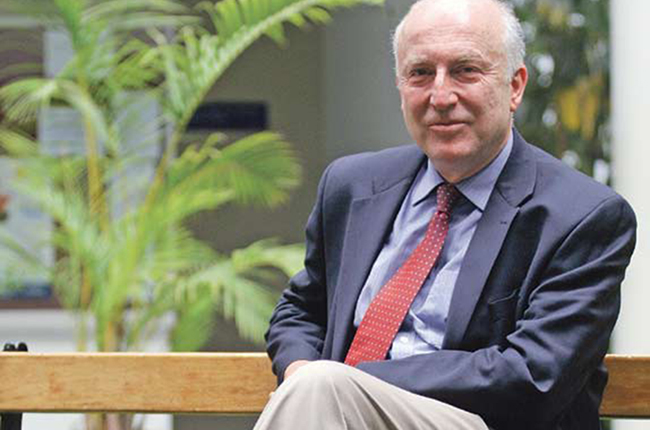
Edwin Williamson en conversación con Dr. Julio Crespo Mac Lennan
JUE 5 JUNIO, 6:30pm
Auditorio del Instituto Cervantes de Londres
Edwin Williamson, M.A., Ph.D., es profesor titular de la “Cátedra Rey Alfonso XIII de Estudios Hispánicos” en la Universidad de Oxford y Fellow de Exeter College, Oxford. Fue titular de la “Cátedra Forbes de Estudios Hispánicos” en la Universidad de Edimburgo, profesor en Birkbeck College, Universidad de Londres, y en Trinity College, Dublin. Ha sido profesor visitante en las universidades de Stanford, Cornell, Denver-Colorado, y en la Universidad de São Paulo, Brasil. Sus publicaciones reflejan su interés tanto por América Latina como por la España del Siglo de Oro. Además de numerosos artículos, es autor de The Half-way House of Fiction: Don Quixote and Arthurian Romance (Oxford University Press, 1984), traducido al español con prólogo de Mario Vargas Llosa (Taurus, 1991); The Penguin History of Latin America (2009), que ha sido traducido al español (Fondo de Cultura Económica, 2014) y al portugués; y de la biografía Borges: A Life (2004), también publicado por Penguin, que ha sido traducido a español (Seix Barral, 2006) y a otras seis lenguas. Ha sido editor de los siguientes volúmenes: Cervantes and the Modernists (1991), Cervantes: Essays in Memory of E.C. Riley, con Jeremy Robbins (2005), Autoridad y poder en el Siglo de Oro, con Ignacio Arellano y Christoph Strosetzki (2009), La autoridad política y el poder de las letras en el Siglo de Oro, con Jesús María Usunáriz (2013), The Cambridge Companion to Jorge Luis Borges (2013).
En inglés
Entrada libre reserva obligatoria reservas.londres@cervantes.es | 0207 201 0752
Edwin Williamson in conversation with Dr. Julio Crespo Mac Lennan
THU 5 JUNE, 6:30pm
Auditorium Instituto Cervantes de Londres
Professor Edwin Williamson, M.A., Ph.D., holds the King Alfonso XIII Chair of Spanish Studies at the University of Oxford and is Professorial Fellow of Exeter College, Oxford. He previously held the Forbes Chair of Hispanic Studies in the University of Edinburgh and posts at Birkbeck College, University of London, and Trinity College, Dublin. He has been a visiting professor at Stanford, Cornell and the University of São Paulo, Brazil, as well as lecturing widely in Spain, Latin America, the USA, and Europe. His teaching and publications reflect his interest in both Latin America and early-modern Spain. In addition to numerous articles, he is the author of The Half-way House of Fiction: Don Quixote and Arthurian Romance (Oxford University Press, 1984), translated into Spanish with a prologue by Mario Vargas Llosa; The Penguin History of Latin America (2009), which has been translated into Spanish and Portuguese, and the biography, Borges: A Life (2004), also published by Penguin, which has been translated into Spanish and six languages. He has edited the following volumes: Cervantes and the Modernists (1991), Cervantes: Essays in Memory of E.C. Riley, with Jeremy Robbins (2005), Autoridad y poder en el Siglo de Oro, with Ignacio Arellano and Christoph Strosetzki (2009), La autoridad política y el poder de las letras en el Siglo de Oro, with Jesús María Usunáriz (2013), The Cambridge Companion to Jorge Luis Borges (2013).
In English
Free admission booking essential reservas.londres@cervantes.es | 0207 201 0752
